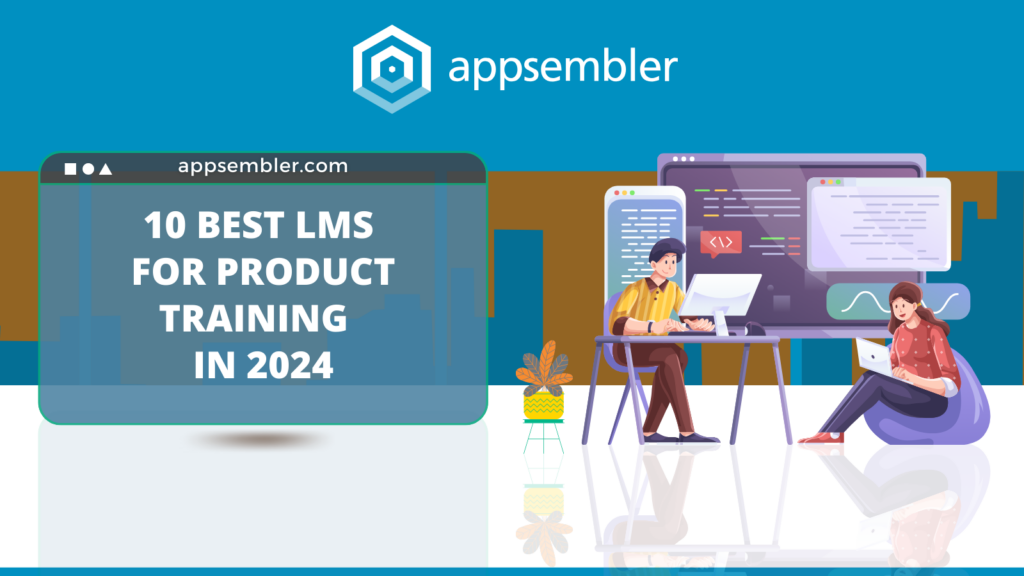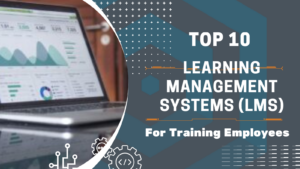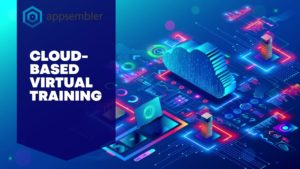Navigating the world of Learning Management Systems (LMS) can be daunting, especially when seeking the ideal tool to enhance your team’s learning and growth. This Best LMS for Product Training guide is crafted to help you understand how top LMS platforms can revolutionize your training processes and help you stay ahead in a rapidly evolving market.
Key Takeaways:
- Customization is Key: Tailor training materials with extensive customization options to fit your company’s unique needs and branding.
- Insightful Analytics: Use advanced analytics tools to track learner progress and assess the effectiveness of your training programs.
- Seamless Integration: Benefit from smooth integration with a wide range of existing software and tools for uninterrupted training processes.
- Mobile Accessibility: Embrace the flexibility of mobile access, enabling learners to engage with materials anytime, anywhere.
- User-Friendly Design: Navigate easily with interfaces designed for users of all tech proficiency levels.
Key Features of each LMS platform
Platform |
Usability and Experience |
Integrations |
Performance Measurement and Assessment |
Cost |
Appsembler |
4.9/5 |
3/5 |
3/5 |
$520-2625 per mo |
Docebo |
4.4/5 |
4/5 |
5/5 |
|
iSpring Learn |
4.6/5 |
4/5 |
4/5 |
User-based pricing starting at $4.08 per user per month, billed annually |
Litmos |
4.2/5 |
3/5 |
4/5 |
|
360Learning |
4.6/5 |
5/5 |
4/5 |
User-based pricing starting at $8 per user per month |
LearnWorlds |
4.7/5 |
3/5 |
4/5 |
$24-279 per month, with custom quotes available for high volume |
Moodle |
4.1/5 |
4/5 |
3/5 |
$120-1660 per mo |
CYPHER Learning |
4.4/5 |
4/5 |
4/5 |
|
TalentLMS |
4.6/5 |
4/5 |
4/5 |
$69-459 per mo |
Adobe Learning Manager |
4/5 |
5/5 |
5/5 |
- Key Features of each LMS platform
- Why Use an LMS for Product Training?
- How to Choose the Best LMS for Product Training
- 1. Appsembler
- 2. Docebo
- 3. iSpring Learn
- 4. Litmos
- 5. 360Learning
- 6. LearnWorlds
- 7. Moodle
- 8. CYPHER Learning
- 9. TalentLMS
- 10. Adobe Learning Manager
- Provide Meaningful Product Training with Appsembler LMS
Why Use an LMS for Product Training?
LMS are pivotal in modern product training, offering a central platform for streamlined, consistent learning experiences. They adapt to the fast-paced market dynamics, ensuring your team is always up-to-date with the latest product knowledge.
An LMS not only caters to various learning styles through customizable content like videos and quizzes but also provides tracking tools for managers to evaluate and enhance training effectiveness.
In essence, an LMS equips your workforce with the necessary skills in a changing market through an adaptive, scalable, and measurable approach.
How to Choose the Best LMS for Product Training
Selecting the right LMS for product training involves considering several key factors to ensure the system meets your training needs effectively. You may want to explore our competitor comparison articles for a deeper dive into these considerations.
Here are the key things to consider when choosing an LMS for product training:
Usability and Experience:
The usability and learner experience of an LMS are fundamental in product training. Opt for a system that facilitates interactive and hands-on learning, potentially including features like virtual IT labs. Look for platforms with Learning Experience Platform (LXP) features such as user-generated content (UGC) and personalized learning paths that cater to diverse learning styles. An effective LMS should offer a variety of content types, moving beyond basic slideshows to keep learners engaged and enhance knowledge retention.
Integrations:
Integrating your LMS with various platforms like LinkedIn, Salesforce, or Shopify can significantly enhance its utility in product training. These integrations streamline training processes and enable seamless data flow, linking the training program with other essential business functions. Look for an LMS that can easily integrate with these and other relevant platforms to enrich your training ecosystem.
Performance Measurement and Assessment:
A top-notch LMS should include comprehensive tools for performance measurement and assessment. In-platform analytics are vital for tracking progress and pinpointing improvement areas. The capability for external analytics integration can provide more in-depth insights. Features like the creation of specific, administrator-led programs and certification generation are critical for validating training effectiveness and skill acquisition.
Cost:
The cost of an LMS is a crucial factor. Choose a platform with transparent pricing to avoid unexpected fees and ensure budget predictability. The cost should reflect the platform’s flexibility and include comprehensive customer support, covering integration support and access for the entire team. An ideal LMS offers value for money, aligning the investment with your organizational training goals and resources.
1. Appsembler
Rating: 4.9/5 (G2).
Key Features of Appsembler:
Appsembler stands out as a leading LMS known for its comprehensive and adaptable features, ideal for enhancing product training programs. The platform offers:
- Asynchronous Learning: A mix of self-guided and instructor-led formats.
- Blended Learning: Combining online digital media with traditional methods.
- Online Accessibility: Easy access to learning materials from anywhere.
- Analytics Monitoring and Dashboarding: Insightful analytics for tracking progress.
- Easy Branding: Customization to align with your company’s branding.
- Worry-Free Hosting: Reliable cloud hosting with minimal IT involvement.
- Third-Party Integrations: Enhances functionality by integrating with various tools.
- Reliable Support: Prompt and effective support for any issues.
- Transparent Pricing: Based on Monthly Active Users (MAUs).
- LXP Features in an LMS: Combining LXP and LMS features. (See LXP vs LMS)
- Virtual IT Labs: Practical, hands-on learning experiences.
- Out-of-the-Box Integrations: Includes Zoom, Analytics, and SCORM.
- Tech Stack Integration: Facilitates integration of your existing technology.
Usability and Experience
Appsembler ensures a great learning experience by integrating the structured approach of an LMS with the adaptability of a Learning Experience Platform (LXP). It provides Virtual IT Labs for hands-on learning and supports both top-down and peer-to-peer learning methodologies. Asynchronous learning options allow learners to progress at their own pace.
The platform’s usability is enhanced through hands-on learning experiences, personalized learning paths using data and user profiles, and an easy-to-use back end. Accessible customer support and straightforward front-end design components simplify administrative tasks. The varied content formats engage users, contributing to a more impactful learning experience.
Integrations
Appsembler offers robust out-of-the-box integrations and custom integration capabilities through its APIs, allowing seamless integration into any workflow. This flexibility is vital for aligning the LMS with specific operational needs. You can review more about their integration capabilities on their products page and technical documentation.
Performance Measurement and Assessment
Appsembler provides tools like Figures for built-in performance measurement, along with analytics integrations through APIs and event-streaming to Segment accounts via the Business Intelligence connector. This suite of tools, complemented by dedicated customer support, ensures effective tracking and improvement of learning outcomes.
Cost
The cost of Appsembler is based on scalable content creation, platform flexibility, customer support, and integrations. The transparent pricing model, detailed on their pricing page, allows for accurate expense forecasting without hidden or setup fees. This structure ensures the cost covers the entire team’s access to the platform, emphasizing value for money.
2. Docebo
Rating: 4.4/5 (G2)
Key Features:
Docebo is renowned for its versatile and feature-rich LMS, offering:
- Certifications: Management of certification programs.
- Coaching App: Facilitates mentorship within the platform.
- Custom Domain: Use of a custom domain for the LMS.
- External Training: Integration and tracking of external training.
- Internal Labeling: Categorization and labeling of courses and content.
- Notifications: Robust notification system for learner engagement.
- White Labeling Options: Extensive white-labeling for branding consistency.
Usability and Experience
Docebo excels in user experience by incorporating gamification elements like points and badges, making learning engaging and competitive. Its efficient course organization, accessible coaching apps, and automation capabilities streamline the learning process. The platform’s design allows superadmins to set automated rules based on specific conditions, enhancing efficiency and consistency.
Integrations
Docebo connects with over 400 SaaS platforms, offering exceptional integration capabilities suitable for diverse business environments. While it limits API calls to 1,000 per hour per IP address, this capacity is ample for most organizations. More about its integration can be found here.
Performance Measurement and Assessment
Docebo uses a unique tool, Learn Data, to export organized learning data, integrating seamlessly into an organization’s existing BI and data ecosystem. This approach centralizes data within familiar BI tools, optimizing the tech stack and enhancing data analysis effectiveness. Further details on Learn Data can be found here.
Cost
Docebo’s pricing is based on active users, offering flexibility and scalability in cost. The pricing includes various features and services such as branding, admin help, custom reporting, integrations, content authoring tools, and Single Sign-On (SSO). More details on their pricing can be found on the Docebo pricing page.
3. iSpring Learn
Rating: 4.6/5 (G2)
Key Features:
iSpring Learn is recognized for its exceptional features that facilitate efficient training:
- Easy Content Creation: Simplifies developing engaging and interactive learning content.
- In-Depth Reporting: Comprehensive tools for tracking and analyzing learner progress.
- Automated Training: Supports automated course assignments and reminders.
- Smart Training: Personalizes learning experiences using intelligent algorithms.
- Employee Engagement: Engages employees with interactive courses and simulations.
Usability and Experience
iSpring Learn enhances user experience with features like social learning through a newsfeed, course feedback, and trainer chat. Gamification elements, such as points and badges, motivate learners, while rich content variation caters to different learning styles. The platform’s interactive and social features, combined with a diverse range of content types, ensure a comprehensive and engaging learning experience.
Integrations
While iSpring Learn offers limited out-of-the-box integrations, it focuses on key tools for seamless functionality. For organizations needing more specialized integrations, iSpring Learn may provide tailored solutions. More information on integrations can be found here.
Performance Measurement and Assessment
iSpring Learn’s in-platform analytics allow organizations to effectively track learner progress and assess training program effectiveness. Supervisor dashboards and scheduled check-ins offer a comprehensive overview of both team and individual performance, crucial for monitoring training outcomes.
Cost
iSpring Learn’s pricing model is designed for simplicity and transparency, based on active users, with unlimited users allowed on any plan. This approach ensures cost-effectiveness, especially for businesses with varying training needs. The platform’s straightforward cost structure, free of hidden fees, offers a clear budgeting advantage.
4. Litmos
Rating: 4.2/5 (G2)
Key Features:
Litmos is a powerful and user-friendly LMS with features that include:
- Ease of Use: Simplified navigation for learners and administrators.
- Quick Deployment and Integration: Rapid setup and over 50 connectors or APIs for integration.
- Robust Content Authoring: Tools for creating engaging training content.
- Gamification and Leaderboards: Features to motivate and engage learners.
- Tracking and Feedback: Comprehensive mechanisms for monitoring learner progress.
Usability and Experience
Litmos offers a great user experience through social learning apps with points and achievements, although it lacks virtual labs. The platform is scalable and flexible, accommodating organizations of various sizes. Video assessments, gamification elements, and custom branding and UI options enhance the learning experience. Packaged integrations ensure Litmos operates smoothly within existing technological infrastructures.
Integrations
Litmos presents a limited range of out-of-the-box integrations, which might be a consideration for organizations that rely heavily on diverse software tools. The need for more integrations reflects the desire to create an efficient learning environment that aligns with the organization’s tech ecosystem. More on Litmos integrations can be found here.
Performance Measurement and Assessment
Litmos provides in-platform reporting capabilities, allowing educators to track and analyze learner performance. The availability of experts on call for interpreting data and advising on training programs based on performance metrics is a unique feature that enhances the platform’s effectiveness in measuring and enhancing training initiatives.
Cost
Litmos offers three pricing tiers, with the basic “Foundation” package covering essential features such as onboarding, security, reporting, foundational content, and implementation. However, the pricing details are not fully transparent on their website, requiring direct contact for comprehensive information. The basic package provides the necessary tools for effectively starting with an LMS, while higher tiers offer more advanced features. More details on pricing can be found on the Litmos pricing page.
5. 360Learning
Rating: 4.6/5 (G2)
Key Features:
360Learning is a dynamic LMS offering:
- Automated Enrollment and Certification Management: Streamlining the enrollment and certification process.
- SSO and Custom User Management Tools: Facilitating easy access and personalized experiences.
- E-commerce and CRM Integrations: Seamless integration with e-commerce platforms and CRM systems.
- Bulk Import: Efficient management of large volumes of learner data.
- SCORM Player: Compatibility with SCORM content.
- Asynchronous and Blended Learning: Supporting various learning formats.
- LXP and LMS Functionalities: Catering to diverse learning needs and styles.
Usability and Experience
360Learning combines the structure of an LMS with the flexibility of an LXP, catering to different learning styles. AI-powered course recommendations deliver skills-based learning, while the platform supports both top-down and peer-to-peer learning. Its focus on asynchronous learning is especially beneficial for adult learners. This blend of personalization, flexibility, and variety enhances the overall user experience.
Integrations
The platform offers an extensive range of integrations, organized by use case, to enhance functionality and efficiency. These integrations ensure seamless synchronization with HR systems and other organizational tools, which is crucial for maintaining accurate learner data. More on 360Learning integrations can be found here.
Performance Measurement and Assessment
360Learning features automated and custom reporting capabilities, intuitive dashboards, and the ability to export reports. These tools provide comprehensive insights into learner performance and engagement, tailored to meet specific organizational needs.
Cost
360Learning’s pricing structure emphasizes value, including the LMS, support, and staff training, with no setup fees. This approach reflects the platform’s commitment to providing a complete learning solution. More details on pricing can be found on the 360Learning pricing page.
6. LearnWorlds
Rating: 4.7/5 (G2)
Key Features:
LearnWorlds offers a variety of features, including:
- Flexible Courses: High customization in course design.
- Assessment Builders: Tools for creating interactive assessments.
- Interactive Videos: Engaging video creation capabilities.
- SCORM Compliance: Compatibility with SCORM content.
- Survey Builder: Collecting valuable feedback.
- Checkouts: Integrated transactions for course enrollment and payment.
- Tech Stack Integrations: Seamless integration with various tools and systems.
Usability and Experience
LearnWorlds excels in user experience by offering interactive and customizable course creation tools, including interactive video capabilities. The intuitive interface ensures easy navigation and assessment builders enable the creation of varied and engaging assessments. This makes LearnWorlds a user-friendly and adaptable platform for online learning.
Integrations
LearnWorlds provides out-of-the-box integrations to enhance LMS functionality. However, it lacks native email integration, potentially complicating communication workflows. More on LearnWorlds integrations can be found here.
Performance Measurement and Assessment
The platform includes automated reporting, course insights, dedicated dashboards, and data visualizations, making it effective in measuring training program performance. These tools provide a comprehensive view of learner engagement and course effectiveness. More details can be found here.
Cost
LearnWorlds offers a flexible pricing structure suitable for individual educators and large organizations, with monthly and yearly plans. Pricing includes course creation tools, website creation capabilities, user management features, and support through email and a help center. Details on pricing can be found on the LearnWorlds pricing page.
7. Moodle
Rating: 4.1/5 (G2)
Key Features:
Moodle, a widely used open-source LMS, offers features such as:
- Personalized Learning Experiences: Customized learning paths for individual needs.
- Automated Emails: Streamlining communication with timely updates.
- Offline Access: Supports learning without internet connectivity.
- Custom Analytics: Detailed tracking of learner progress.
- Plagiarism Detection Integration: Maintaining academic integrity.
- Classroom Orientation: Designed for classroom-based learning.
Usability and Experience
Moodle emphasizes accessibility, engagement, and security to ensure a positive user experience. It includes certified integrations, a mobile app for learning on the go, offline access, and “Always on” security. Gamification elements are incorporated to increase learner engagement and motivation.
Integrations
Moodle stands out for its nearly 2,000 certified integrations and plugins, with additional open-source options for customization. This extensive integration capability makes Moodle highly adaptable to various technological ecosystems.
Performance Measurement and Assessment
Moodle’s custom reporting feature allows educators to analyze course performance and learner engagement, though specific details are minimal on the website. This functionality is vital for tailoring teaching strategies based on data-driven insights.
Cost
MoodleCloud’s pricing structure, starting at $120 USD annually for up to 50 users, includes features like personalized site names, unlimited courses, site usage tracking, integrated video conferencing, and self-service support. This pricing makes Moodle a cost-effective option for small to medium-sized entities. More details can be found on the MoodleCloud pricing page.
8. CYPHER Learning
Rating: 4.4/5 (G2)
Key Features:
CYPHER Learning, with its focus on innovative and engaging learning solutions, offers key features such as:
- Skills-Based Learning: Tailoring experiences to develop specific skills.
- Automated Course Creation: Streamlining the course creation process.
- Gamification Elements: Engaging learners with games and leaderboards.
- Advanced Reporting and Analytics: Providing detailed insights into learner performance and course effectiveness.
Usability and Experience
CYPHER Learning focuses on providing an engaging user experience. Features include multiple assessment types, a universal translator, automated actions, built-in messaging and chat, community groups, and web conferencing integrations. These elements, along with collaborative tools like wikis, forums, and blogs, enhance learning and communication. More on the user experience can be found here.
Integrations
The platform offers a range of integrations, including built-in, Zapier, and API 2.0 connectivity, seamlessly integrating with Google and Microsoft ecosystems. These integrations provide flexibility and enhance the platform’s functionality. Details on CYPHER Learning integrations are available here.
Performance Measurement and Assessment
CYPHER Learning includes built-in reporting, custom reporting, reporting integrations, and compliance reporting. These features allow for comprehensive tracking of learner progress and the effectiveness of training programs. Trigger actions during compliance periods automate necessary actions, contributing to an effective assessment process. More on performance measurement can be found here.
Cost
CYPHER Learning’s pricing is not explicitly detailed on its website, indicating a personalized pricing approach. Potential users are encouraged to contact the company for a customized quote to align with their specific training needs. Further information on pricing plans is available here.
9. TalentLMS
Rating: 4.6/5 (G2)
Key Features:
TalentLMS, renowned for its intuitive and flexible learning platform, offers a suite of features that include:
- Course Creation: Easy course building with various media types and support for SCORM, xAPI, or cmi5 files.
- Test Creation: Tools for developing assessments.
- Meeting Integrations: Compatibility with virtual meeting platforms for live sessions.
- Automation of Tasks: Streamlining administrative tasks.
- In-Platform Reporting: Real-time, scheduled, and custom reports, dynamic dashboards, and training infographics.
- Tech Stack Integration: Seamless connectivity with other business systems.
Usability and Experience
TalentLMS focuses on user engagement with gamification elements and a simple, intuitive interface. Its flexibility extends to various file types and device compatibility, including offline mobile learning, ensuring accessibility for all users.
Integrations
The platform offers integration capabilities through Zapier, allowing seamless connection with a wide range of third-party services. These integrations facilitate efficient updates and a user-friendly experience. More information on TalentLMS integrations is available here.
Performance Measurement and Assessment
TalentLMS provides comprehensive tools for performance measurement, including real-time reporting, dynamic dashboards, and the ability to export data to Excel. These features ensure detailed analysis and informed decision-making for training strategies.
Cost
TalentLMS offers tiered pricing, making it suitable for businesses of various sizes, with unlimited courses and email support across all plans. The scalability based on user numbers makes it cost-effective, especially for growing companies. A free trial is available for testing the platform before financial commitment. Pricing details can be found on the TalentLMS pricing page.
10. Adobe Learning Manager
Rating: 4/5 (G2)
Key Features:
Adobe Learning Manager, a comprehensive learning solution, offers features including:
- Personalized Learning with AI and ML: Tailoring experiences using AI and ML.
- Custom Learning Programs: Designing educational programs for onboarding and training.
- Calendar Widgets: Organizing and scheduling learning activities.
- Certifications: Managing certifications within the platform.
- Gamification and Social Learning: Using scoreboards to enhance engagement.
- Team Performance Reports: Insights into team progress and material mastery.
- Learning Platform Analytics: Detailed analytics for organizational compliance and learning effectiveness.
- Simple Administration and Integration: Easy management of learning programs and integration with existing systems.
Usability and Experience
Adobe Learning Manager emphasizes a personalized learning experience with features like a tailored learner home page, admin-recommended training, AI-powered recommendations, and peer-recommended training. The content marketplace and learning plans add to a highly personalized and engaging learning journey.
Integrations
The platform has a comprehensive suite of integrations, including custom connectors and APIs. Out-of-the-box connectors and FTP transfers for data import/export, along with integration with content providers like LinkedIn Learning, enhance its functionality. Built-in connectors with platforms like Salesforce and Adobe Experience Manager Sites streamline processes.
Performance Measurement and Assessment
Adobe Learning Manager offers a suite of performance measurement tools, including in-platform reporting, team performance reports, learning platform analytics, compliance dashboard, learner transcripts, role-based reporting, feedback reports, and instructor-led training reports. These tools provide a thorough perspective on learning performance, aiding in data-driven decision-making for optimizing training programs.
Cost
Adobe Learning Manager’s pricing includes registered user and monthly active user models, accommodating varying organizational needs. The registered user model suits continuous course access, while the monthly active user model offers flexibility based on user engagement. Specific pricing details are not available publicly but can be inquired about on the Adobe Learning Manager pricing page.
Provide Meaningful Product Training with Appsembler LMS
Appsembler distinguishes itself in the product training arena by seamlessly merging the functionalities of an LMS and an LXP. This unique combination caters to both structured learning and exploratory approaches, accommodating a variety of learning styles. Its standout feature, Virtual Training Labs, offers immersive, hands-on experiences crucial for effective product training.
The platform is designed for user-friendliness, providing personalized learning paths and robust integrations that facilitate a seamless and engaging learning journey. Additionally, Appsembler’s commitment to reliable customer support ensures a smooth and efficient training process.
Discover the transformative impact of Appsembler on your product training initiatives. Experience its capabilities firsthand by booking a demo or scheduling a consultation with our experts today, and see how it can elevate your training strategies.



